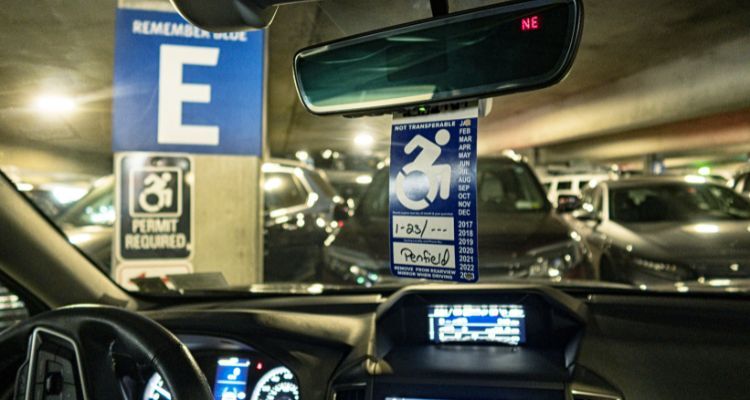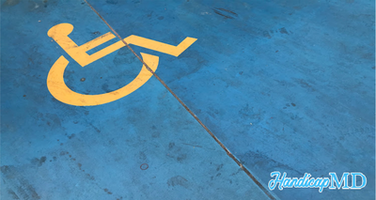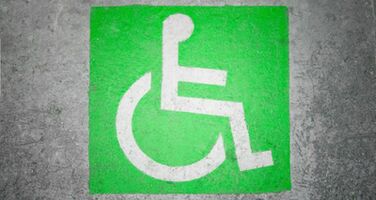
Tips for Displaying Your Handicap Placard Correctly in New Hampshire
Disability tags, or handicap placards, are crucial for individuals with limited mobility, providing them with access to designated parking spaces that make day-to-day tasks and activities more manageable. If you live in NH and rely on a disability tag, it’s essential to understand how to use and display it properly to avoid fines and ensure compliance with state laws. While the process may seem straightforward, there are specific rules and guidelines that must be followed to maintain the integrity and functionality of your tag. This comprehensive guide will provide you with everything you need to know about displaying your handicap placard correctly in New Hampshire, along with some practical tips and answers to common questions.
Understanding the Purpose of a Handicap Placard
Disability tags serve a vital purpose: to help people with limited mobility access parking spaces that are closer to building entrances and more convenient for individuals who cannot walk long distances. These tags help ensure that people who need accessible parking spaces can use them, enhancing their independence and quality of life. In NH, like many other states, strict rules govern the issuance and use of disability tags to prevent misuse and protect these essential handicap parking spots.
Types of Disability Tags Available in NH
NH offers several types of handicap permits to cater to the needs of different individuals:
- Permanent Tags: For individuals with long-term or lifelong disabilities. These tags must be renewed every five years, although they typically do not require new medical certification for renewal.
- Temporary Tags: For individuals with short-term disabilities, such as recovering from surgery or an injury. These tags are valid for up to six months and require medical recertification if the condition persists.
- Disability License Plates: These plates are assigned to vehicles owned by individuals with disabilities or their family members who frequently transport them. Disability plates provide the same parking privileges as tags but are permanently affixed to the vehicle.
Each type of tag has its own set of rules for use and renewal, and it’s essential to know which one you have before learning about proper display and usage.
Eligibility for a Disability Tag in NH
To qualify for a disability tag in NH, applicants must have a medically certified condition that severely limits mobility. This can include:
- Inability to walk more than 200 feet without resting
- Use of a wheelchair, cane, crutches, or other mobility aids
- Severe cardiac, pulmonary, or orthopedic conditions
- Visual impairments that severely restrict the ability to walk safely
A licensed healthcare provider must certify the disability on the application form, ensuring that only eligible individuals receive a disability tag.
How to Apply for a Handicap Placard in New Hampshire
Applying for a New Hampshire handicap placard involves a few simple steps:
Step 1: Obtain the Application Form: Download the Application for Walking Disability Privileges (Form DSMV 16) from the state DMV website, or pick one up at your local DMV office.
Step 2: Complete the Applicant Section: Fill out the applicant information, including your name, address, and contact details.
Step 3: Obtain Medical Certification: A licensed HandicapMD healthcare professional must complete the medical certification section, verifying that you meet NH’s eligibility requirements for a disability tag.
Step 4: Submit the Application: Submit the completed application to the DMV in person or by mail. The application should include any supporting documentation required by the DMV, such as identification or vehicle registration for disability license plates.
Fees: Disability tags are typically issued free of charge. However, standard registration fees apply for disability license plates.
The process is straightforward, but make sure all parts of the form are completed correctly to avoid delays.
Tips for Displaying Your Handicap Placard Correctly in New Hampshire
Correctly displaying your handicap placard is essential for ensuring that you avoid penalties and maintain your parking privileges. Here are some important tips on displaying and using your tag responsibly.
1. Hang the Tag from the Rearview Mirror
Your disability tag should be hung from the rearview mirror whenever your vehicle is parked in an accessible space. This ensures that it is clearly visible from the outside, allowing parking enforcement officers to confirm that your vehicle is authorized to use the space.
- Visibility: Ensure that the side showing the expiration date and other identifying information is facing outward.
- Positioning: Make sure the tag is easily readable through the windshield. If the tag is obscured, you could receive a ticket, even if you are legally parked in an accessible spot.
2. Remove the Tag While Driving
It is essential to remove your disability tag from the rearview mirror while driving. Hanging objects from the mirror can obstruct your view, creating a potential safety hazard and violating NH’s traffic laws.
- Storage: Place the tag in a designated location in your vehicle, such as the glove compartment, when not in use. This minimizes the risk of loss or damage.
3. Use the Tag Only When the Holder is Present
Disability tags are issued specifically to the individual with the disability. It is illegal to use the tag if the eligible individual is not in the vehicle. Using a disability tag when the qualified person is not present can result in penalties, fines, and even suspension of the tag.
- Authorized Use: The tag holder must be either the driver or a passenger when the disability tag is in use. Lending the tag to family members or friends is strictly prohibited.
4. Check the Expiration Date Regularly
Temporary and permanent tags come with expiration dates. It’s crucial to be aware of when your tag expires and renew it before the expiration date to avoid lapses in your parking privileges.
- Temporary Tags: Typically valid for up to six months. Renewal requires new medical certification.
- Permanent Tags: Valid for five years and generally do not require new medical certification for renewal. Keep track of your renewal date to avoid accidentally using an expired tag.
5. Avoid Damaging or Altering the Tag
Keeping your disability tag in good condition is important. Tags that are bent, torn, or illegible can be considered invalid by parking enforcement officers.
- Tag Protection: Use a protective cover or case to prevent wear and tear. Avoid placing heavy objects on top of the tag to prevent it from bending or cracking.
- No Alterations: Do not attempt to change or alter any information on the tag, as this is considered tampering and can lead to fines or revocation.
6. Report Lost or Stolen Tags Immediately
If your disability tag is lost or stolen, report it to the New Hampshire DMV as soon as possible. You will need to apply for a replacement, and the DMV may require additional documentation to process your request.
- Replacement: Contact your local DMV office for the steps and any applicable fees for replacing a lost or stolen tag.
7. Be Mindful of Local Parking Regulations
While disability tags provide access to accessible spaces, it’s important to note that not all spaces may offer unlimited parking time. Some municipalities enforce time restrictions for accessible parking spaces, especially in high-demand areas.
- Metered Parking: Check local ordinances to determine whether your disability tag allows you to park for free or extends time limits at metered spaces.
- Specific Restrictions: Some cities may have unique rules regarding accessible parking. Familiarize yourself with local parking laws to avoid fines.
Common Mistakes to Avoid When Using Your Handicap Permit
Avoiding mistakes when using your disability tag is key to making sure you don’t run into any issues. Here are some common mistakes to be aware of:
- Leaving the Tag Hanging While Driving: This is one of the most frequent errors and can result in fines or safety hazards.
- Misplacing the Tag: Losing your tag can make it challenging to access accessible parking, so always store it in a secure location when not in use.
- Letting Others Use Your Tag: Your disability tag is for your use only. Allowing someone else to use it, even if they are a family member, is considered misuse and can lead to penalties.
Being vigilant about these mistakes can save you a lot of trouble down the road.
Rules for Using a Disability Tag in New Hampshire
The state of NH has specific rules regarding the use of disability tags:
- Who Can Use the Tag: Only the person to whom the tag is issued may use it, and they must be in the vehicle, either as the driver or a passenger, when the tag is being used.
- Authorized Parking Spaces: The tag allows parking in designated accessible spaces but does not grant permission to park in no-parking zones, fire lanes, or other restricted areas.
- Time Limits: While the tag may grant access to metered parking without payment in some areas, there may be time restrictions. Always check local regulations.
Knowing and following these rules ensures that accessible parking spaces remain available for those who need them.
What to Do If Your Disability Tag is Lost, Stolen, or Damaged
If your disability tag is lost, stolen, or damaged, it’s important to act quickly to get a replacement:
- Report Stolen Tags to Law Enforcement: File a police report if your tag is stolen. This may be necessary for your replacement application.
- Apply for a Replacement: Visit your local DMV office or download the necessary forms online to request a new tag. You may need to provide proof of identity and the police report if applicable.
- Pay Any Required Fees: Some fees may apply for replacing lost or stolen tags, so check with the DMV for specifics.
Keeping a copy of your original application and any related documents can speed up the replacement process.
Tips for Protecting Your Disability Tag from Theft
To minimize the risk of your disability tag being stolen:
- Store the Tag Securely: When not in use, keep your tag in a hidden location, like the glove compartment.
- Avoid Leaving It Visible: Tags left hanging from the mirror can be tempting targets for thieves. Always remove and store them safely when not needed.
- Mark Your Tag: Consider writing your name and phone number on the back of the tag with a permanent marker. This way, it may be returned if found.
Being proactive about security can save you the hassle of replacing a lost or stolen tag.
How to Use Your Disability Tag When Traveling Out of State
Your NH disability tag is generally valid in all other states, but there are a few things to keep in mind when traveling:
- Check Local Laws: Parking regulations can vary by state and city, so it’s wise to familiarize yourself with local rules before you travel.
- Bring Documentation: Carry a copy of your disability certification or doctor’s note, just in case you need to prove your eligibility.
- Follow Display Guidelines: Always display your tag correctly, even when traveling, to avoid fines and confusion.
Planning ahead can make your travels smoother and ensure you have access to the parking accommodations you need.
Understanding Penalties for Misuse of a Disability Tag in NH
Misusing a disability tag in NH can result in severe penalties, including:
- Fines: Misuse can lead to substantial fines, especially if the tag is used by someone other than the person it was issued to.
- Confiscation: Law enforcement has the authority to confiscate a tag if it is being misused.
- Suspension of Privileges: Repeated misuse may lead to the suspension of your disability parking privileges.
It’s crucial to use your tag responsibly to maintain access to the benefits it provides.
Frequently Asked Questions (FAQs)
Q1: Can a family member use my disability tag if I am not in the vehicle?
No, disability tags are non-transferable and can only be used when the eligible individual is present in the vehicle. Unauthorized use can result in penalties, including fines and revocation of the tag.
Q2: How often do I need to renew my permanent disability tag?
Permanent disability tags in NH must be renewed every five years. The DMV will typically send a reminder, but it’s your responsibility to ensure your tag remains valid.
Q3: Can I park for free at metered parking spots with my disability tag?
In some areas, yes. However, you should check local parking regulations to be sure, as rules about metered parking can vary.
Q4: What should I do if I receive a parking ticket despite displaying my tag correctly?
If you believe you were ticketed unfairly, you can contest the ticket by providing proof that your tag was displayed correctly. This may involve showing photographs or other evidence.
Q5: Do I need a new doctor’s certification to replace a lost or stolen tag?
In most cases, if your original application is still on file and your disability status has not changed, you won’t need a new certification. However, check with the DMV to confirm.
Q6: Are there penalties for leaving the tag hanging while driving?
Yes, leaving your tag hanging from the rearview mirror while driving can result in fines and is a safety hazard because it obstructs your view.
Q7: Can I use my NH disability tag in other states?
Yes, disability tags issued in NH are recognized in most other U.S. states under reciprocity agreements. However, it’s wise to review local parking regulations when traveling, as each state has specific rules for accessible parking.
Q8: What should I do if my disability tag is lost or stolen?
If your disability tag is lost or stolen, contact the state DMV immediately to request a replacement. You may need to fill out a replacement application and provide identification to receive a new tag.
Q9: Are there any fees for obtaining or renewing a disability tag in NH?
No, disability tags are issued free of charge. However, if you have a disability license plate, you may be required to pay the standard registration fees.
Q10: How long does it take to receive a replacement disability tag if mine is lost or stolen?
Processing times vary, but most replacement applications are processed within a few weeks. Contact the DMV for specific details about current processing times.
Q11: What should I do if I find my lost disability tag after I have received a replacement?
If you find your original disability tag after receiving a replacement, return it to the DMV. Using multiple tags is not permitted, and returning the duplicate helps ensure the integrity of the accessible parking system.
Conclusion: Making the Most of Your Disability Tag
Displaying your handicap placard correctly in New Hampshire is essential for making the most of your accessible parking privileges while staying compliant with state laws. By following the guidelines for proper display, only using the tag when the qualified individual is present, and keeping track of expiration dates, you can enjoy the benefits of accessible parking with ease and convenience.
Disability tags play a crucial role in supporting the independence and mobility of individuals with disabilities. Using these tags responsibly ensures that accessible parking spaces remain available for those who genuinely need them, fostering a respectful and inclusive environment in communities across NH.
.png)






